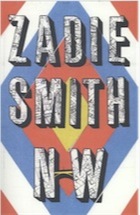Zadie Smith

'I like writing that makes you hear voices. It really is a sort of magic' …Zadie Smith Photograph: Roderick Field/Penguin press office
What's this novel about? My books don't seem to me to be about anything other than the people in them and the sentences used to construct them. Which makes NW sound like an "exercise in style", a phrase you generally hear people using as an insult of one kind or another. But to me, an exercise in style is not a superficial matter – our lives are also an exercise in style. The hidden content of people's lives proves a very hard thing to discern: all we really have to go on are these outward, manifest signs, the way people speak, move, dress, treat each other. And that's what I try to concern myself with in fiction: the way of things in reality, as far as I am able to see and interpret them, which may not be especially far.
 When I was writing this novel what I really wanted to do was create people in language. To do that you must try to do justice simultaneously to the unruly, subjective qualities of language, and to what I want to call the concrete "thingyness" of people. Which was Virginia Woolf's way of being a modernist – she loved language and people simultaneously – and her model is important to me. I admire Beckett and respect Joyce. I love Woolf. Whenever the going gets tough I reread her journals and it helps me through.
When I was writing this novel what I really wanted to do was create people in language. To do that you must try to do justice simultaneously to the unruly, subjective qualities of language, and to what I want to call the concrete "thingyness" of people. Which was Virginia Woolf's way of being a modernist – she loved language and people simultaneously – and her model is important to me. I admire Beckett and respect Joyce. I love Woolf. Whenever the going gets tough I reread her journals and it helps me through.
What inspired this novel? Two seeds seem important, one involving
thingyness and the other, language. About eight years ago a girl in distress came to my door, a stranger, and asked me for help. Said she needed money – so I gave it to her. Later I found out that it was probably a scam of some sort. A lot of questions followed from this in my mind. Was the girl really desperate? Was I a fool to give her the money? But wouldn't you have to be really desperate to come up with such a scam? The episode, tiny as it was, stayed with me. It became a fruitful sort of problem – connecting with ideas I'd had for a long time about class and desperation and ethics – and eight years later a whole novel sprang from it.
More
 When I was writing this novel what I really wanted to do was create people in language. To do that you must try to do justice simultaneously to the unruly, subjective qualities of language, and to what I want to call the concrete "thingyness" of people. Which was Virginia Woolf's way of being a modernist – she loved language and people simultaneously – and her model is important to me. I admire Beckett and respect Joyce. I love Woolf. Whenever the going gets tough I reread her journals and it helps me through.
When I was writing this novel what I really wanted to do was create people in language. To do that you must try to do justice simultaneously to the unruly, subjective qualities of language, and to what I want to call the concrete "thingyness" of people. Which was Virginia Woolf's way of being a modernist – she loved language and people simultaneously – and her model is important to me. I admire Beckett and respect Joyce. I love Woolf. Whenever the going gets tough I reread her journals and it helps me through.What inspired this novel? Two seeds seem important, one involving
thingyness and the other, language. About eight years ago a girl in distress came to my door, a stranger, and asked me for help. Said she needed money – so I gave it to her. Later I found out that it was probably a scam of some sort. A lot of questions followed from this in my mind. Was the girl really desperate? Was I a fool to give her the money? But wouldn't you have to be really desperate to come up with such a scam? The episode, tiny as it was, stayed with me. It became a fruitful sort of problem – connecting with ideas I'd had for a long time about class and desperation and ethics – and eight years later a whole novel sprang from it.
More
No comments:
Post a Comment